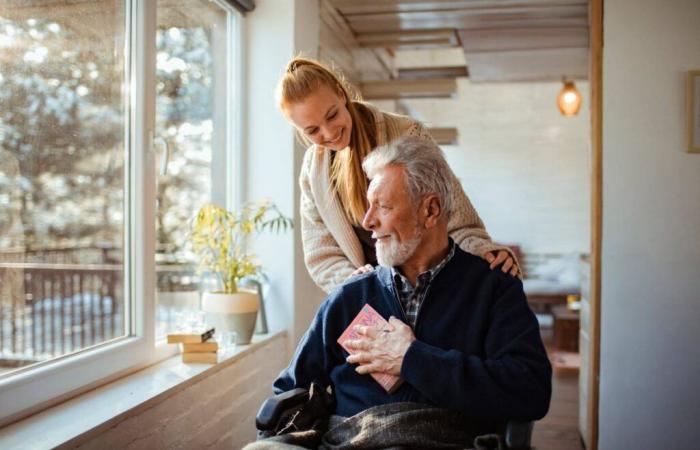Before answering this question, it is important to gain perspective from the current beginnings which are ruthlessly and indiscriminately destroying nursing homes. They would all be put in the same bag, horrible and necessarily to be avoided. A repulsive image accentuated by the Covid-19 episode and by the injunction of public authorities to keep seniors at home, as well as by the publication of the book The Gravediggersby Victor Castanet (Fayard).
Placement in a nursing home for a loved one: proof of love
No wonder, in this context, that most French people say they want to die at home. “ At the time of choice, families feel guilty, denounces Geneviève Demoures, vice-president of the France Alzheimer and related diseases association. Whereas, on the contrary, it represents an opportunity to be able to entrust your parent to a caring establishment when the illness worsens. It means that we love him and that we want him to be taken care of in the best way, in a good care environment, she explains. Because it must be understood that nursing homes mainly welcome people who are sick or at the end of their lives, and not independent seniors. The entry of a loved one into a nursing home does not call into question either our skills or our love. The decision responds to a need for continuous care and 24-hour monitoring, justified, for example, by the progression of a neurodegenerative disease. »
A point of view shared by gerontologist Annie de Vivie, who confirms: “ When their state of health deteriorates, when our parent is very disoriented, the nursing home or USLD is made for them, since the presence of caregivers is permanently ensured in these establishments, unlike all other modes of reception in residence. »
Also discover: Succession: 6 tips for preparing it well
Free choice, a right for the parent
Once this clarification has been made, another fundamental element must be remembered: the decision to leave their accommodation for an Ehpad rests with the person concerned. “ The regulations are very clear, insists Dr Duy Nghiem, expert geriatrician at the National Solidarity Fund for Autonomy (CNSA). TEveryone has the freedom to choose their residence and their assistance. This is included in the Social Action and Families Code (article L311-3). Concretely, this means that, at the time of your parent’s entry into a nursing home, their consent must be sought by the staff of the establishment, including if they are protected by a guardianship or curatorship measure. »
As such, know that if your parent is still in possession of their faculties, they have complete freedom to designate the place where they wish to spend the end of their life. Wishes that he can express by writing either advance directives or a future protection mandate. The advantage: when the time comes, having determined your expectations in advance will greatly facilitate the task of those close to you. This will also limit the risk of family discord and guilt since, with this type of arrangement, those around them are not responsible for making the decision, but only for ensuring that their parent’s wishes are respected.
Between consent and the need for care, a large gray area
In summary, for Dr Duy Nghiem, “ If your parent refuses to reside in a retirement home, in principle, their decision takes precedence over yours. In practice, he adds, however, there are exceptions, notably in cases of danger, emergency and inability to express one’s will. “. Not to mention this large gray area in which people find themselves who, although wishing to stay at home, resign themselves to leaving their home at the request of their spouse and/or their children, driven, very often, by a need. security. Clearly, here as in many areas, there is a gulf between theory and practice, between the law and real life.
And, in fact, obtaining the effective consent of an elderly person and the conditions for exercising their free choice prove particularly difficult to achieve, especially when the decision must be made urgently, following hospitalization. , For example. The request is then generally made not by the person themselves but by their family. In the latter case, the priority must be to make the best possible decision at the time. Because only certain situations require entry into an institutionbelieves Geneviève Demoures. In other words, there are criteria for entering an establishment to be defined and validated collectively between the person, home service professionals, the family, doctors, associations, etc. For example, the question of entry into a nursing home or USLD may arise in the event of refusal of any assistance or wandering on the public highway, with a risk of worrying disappearance. »
Also discover:Advance directives: here’s why it’s important, according to a notary
Looking for the best compromise with your parent
Ideally, this should be discussed, when possible, with your parent. Collecting his wishes, visiting establishments with him, testing the day hospital, temporary accommodation, etc. can help change his vision of the nursing home and find a place where he will feel safer and less isolated. We must also prepare for the transition, knowing that poor arrival conditions constitute a factor in worsening dependency. “ We must be awarepoints out Annie de Vivie, that entering an establishment marks a brutal transition from a chosen life to a life in a community, with the need to support one’s parent, to personalize their room, to help them get back on track…»
This change in lifestyle, this modification of social relationships and family ties, promiscuity with strangers can cause great suffering and be coupled with a feeling of abandonment or, quite the contrary, result in a resumption of social ties. . A radical change that requires a lot of investment and support from your loved one. For their well-being, you must be able to find your place in this new place of life, alongside the team of caregivers and in trust with them.
What is the difference between Ehpad and USLD?
These two accommodation structures offer similar services and prices. However, the first are nursing homes and the second are structures installed in health establishments (hospitals, clinics, etc.) with greater medical resources. They are aimed at very dependent people (GIR 1 or 2), whose state of health requires significant care.
Advance directives: choices that are binding on everyone
If your parent knows they have a slowly progressive neurodegenerative disease, they can express their wishes in this document. He will specify his wishes in the event that he has permanently lost consciousness. Their advance directives must be respected by their loved ones and all health professionals. Your parent will indicate whether they accept or refuse to be kept alive artificially. He can also plan for the possibility of entering an establishment or being equipped with a geolocation system when the illness has reached an advanced stage to the point that he can no longer live at home.
More information on sante.gouv.fr.
Alzheimer’s disease: a personalized care pathway
« There is sometimes confusion between elderly people and Alzheimer’s disease, estimates Geneviève Demoures, vice-president of the France Alzheimer association. However, when we age without cognitive disorders, the answers are very different. Concerning Alzheimer’s and related diseases, which progress slowly, sometimes over twenty years, the ideal is to consider a treatment path as early as possible. Once the diagnosis has been made, you must dare to address the question with your parent and anticipate alternatives at home likely to respond to their desires, but also to their needs and the evolution of their pathology… without forgetting the solutions of respite to support caregivers. We must not rely on staying at home, which is sometimes unsuitable and even dangerous. Because if this option is possible at the beginning, after a certain stage, to slow down the effects of the disease (aggression, wandering, etc.), an Alzheimer’s patient requires care that only qualified professionals can provide in an establishment. »
*USLDs (long-term care units) are accommodation and care structures which mainly accommodate people aged over 60. They are generally attached to a hospital establishment. The medical resources implemented there are greater than in EHPADs (accommodation establishments for dependent elderly people).






